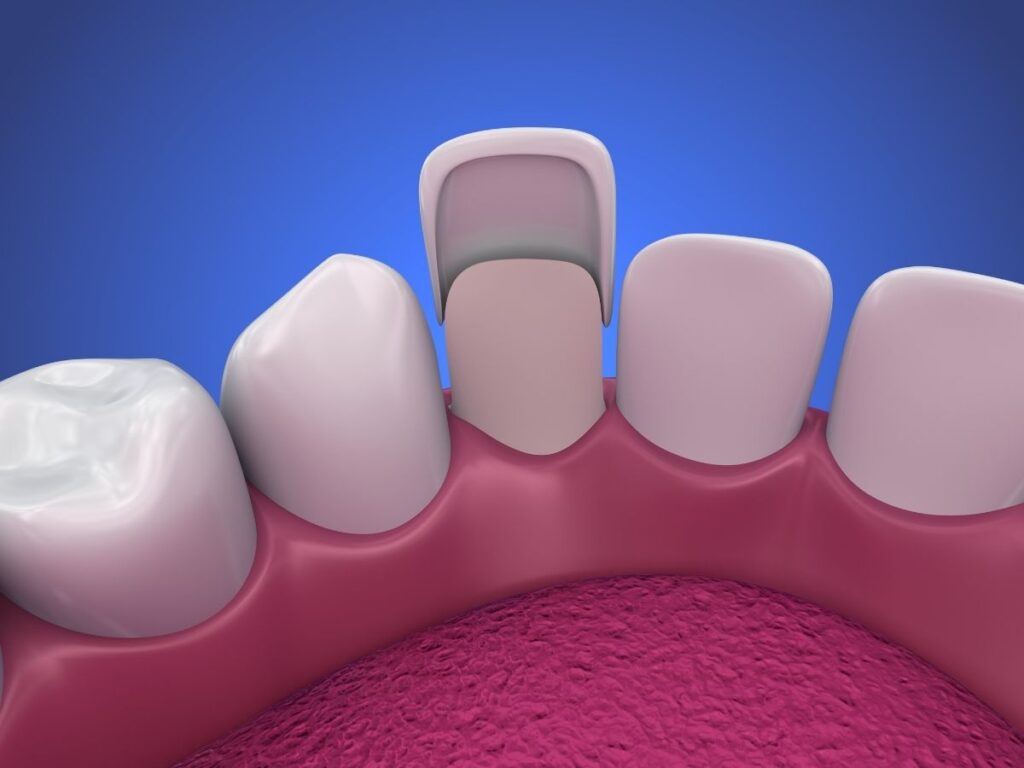In the age of social media and selfies, a radiant smile has never been more sought after. Dental veneers offer a long-lasting and quick solution for various dental issues affecting your confidence and quality of life. However, veneers are more than just a cosmetic fix; they can also serve functional purposes, such as protecting a damaged tooth. Let’s delve deep into dental veneers, providing you with all the information you need—from the procedure to the costs involved and how to determine if you’re a suitable candidate.
What are Dental Veneers?
Dental veneers are custom-made, wafer-thin shells designed to cover the front surface of your teeth. These shells are bonded to your teeth, effectively altering their shape, size, and color to improve their appearance. In addition to offering both aesthetic and functional benefits, dental veneers can address a wide range of dental issues.

Types of materials used
When it comes to dental veneers, you have a couple of material options to choose from, each with its own set of advantages and disadvantages:
Porcelain Veneers
Crafted from high-quality ceramic, porcelain veneers are the gold standard in dental veneers. They give a realistic appearance that closely matches the translucency of natural teeth. Porcelain is also highly resistant to coffee, tea, or tobacco staining. The downside is the cost; porcelain veneers are generally more expensive than their composite counterparts.
Composite Resin Veneers
Made from a material that resembles the color of teeth, composite resin veneers are a more budget-friendly option. They can be applied in a single dental visit and are easier to repair if damaged. However, they are less durable than porcelain and may require more frequent replacements.
Common reasons for getting veneers
Dental veneers are a favored option for a variety of dental concerns. Here are some of the most common reasons people opt for veneers:
Teeth Whitening
Veneers offer a permanent whitening solution for teeth that have been severely discolored due to medications, excessive fluoride, or other reasons.
Cosmetic Corrections
Minor issues like chips, cracks, and slight misalignments can be easily corrected with veneers.
Gap Closure
Veneers can be designed to close unsightly gaps between teeth, offering a more uniform appearance.
Smile Makeover
For those looking to change the appearance of their smile dramatically, veneers provide a comprehensive solution that addresses multiple issues at once.
Tooth Protection
Worn-down or eroded teeth can be protected and strengthened with veneers, preventing further damage.
How Much of the Tooth is Removed for Dental Veneers?
In order to prepare the tooth for the dental veneer, the dentist will need to remove a small amount of enamel. This ensures the veneer fits properly and looks natural alongside your other teeth. The preparation process usually involves the following steps:
- Consultation and X-rays: An initial consultation is necessary to determine the suitability of your teeth for veneers. X-rays may be taken for a more detailed assessment.
- Local Anesthesia: To minimize discomfort, a local anesthetic may be applied to numb the area around the tooth or teeth receiving the veneer.
- Enamel Removal: The dentist will then carefully remove a layer of enamel from the tooth’s surface using a grinding tool.
The amount of enamel removed typically ranges from 0.3 to 0.5 millimeters, depending on the type of veneer and the specific needs of the patient. The thickness of the veneer applied to the tooth surface is roughly equal to this.
The removal of tooth enamel is a critical step in the veneer application process for several reasons:
Fit and Function: Removing enamel ensures that the veneer will fit seamlessly with your natural teeth aesthetically and functionally.
Bonding: The removal of enamel creates a rough surface that allows for stronger bonding between the veneer and your natural tooth.
Natural Appearance: Proper preparation helps achieve a more natural look, ensuring the veneer blends in well with your surrounding teeth.
Longevity: A well-prepared tooth surface can enhance the longevity of the veneer, making it more durable and less likely to come off.
How Long Do Veneers Last?
The longevity of dental veneers varies based on several factors, including the type of material used and the level of maintenance. Typically, porcelain veneers have 10 to 15 years of longevity, whereas composite resin veneers last about 5 to 7 years. While veneers are a sturdy choice for smile improvement, it’s crucial to remember they aren’t everlasting and will need replacement eventually.
Factors Affecting Longevity
Several factors can influence how long your dental veneers last:
Material Quality
High-quality materials like porcelain tend to last longer than composite resin.
Oral Hygiene
Poor oral hygiene can lead to issues like decay under the veneer, reducing lifespan.
Diet and Lifestyle
Consuming hard or acidic foods and beverages can wear down veneers more quickly. Smoking can also stain veneers over time.
Oral Habits
Habits like teeth grinding (bruxism) can significantly shorten the life of your veneers.
Professional Care
Regular dental cleanings and check-ups can help extend the life of your veneers.
Maintenance Tips
To prolong the life of your dental veneers, consider the following maintenance tips:
- Just like your natural teeth, maintain daily oral hygiene by brushing and flossing regularly.
- Exercise caution while consuming hard or crunchy foods to prevent chipping the veneers.
- Avoid smoking, as it can cause discoloration and compromise the look of your veneers.
- If you’re prone to teeth grinding, consider using a mouthguard for your veneers. 5. Keep up with routine dental visits for veneer inspections and professional cleanings.
By adhering to these guidelines and being aware of the elements that influence your veneers’ lifespan, you can ensure a radiant smile for an extended period.
What is the Typical Cost of Veneers?
Dental veneer costs vary based on several factors. Porcelain veneers typically range from $1,000 to $2,500 per tooth, while composite veneers cost between $250 and $1,500 per tooth. Dental treatment can be more expensive in urban areas and vary depending on the dentist’s experience. Additional procedures like gum reshaping may add to the cost. Dental insurance usually only covers veneers if they serve a restorative purpose.
Who is a Candidate for Dental Veneers?
The perfect candidate for dental veneers typically exhibits several key traits:
Good Oral Health
The individual must have no active gum disease, tooth decay, or root canal infections. These conditions must be treated before considering veneers.
Sufficient Enamel
Dental veneers require a certain amount of existing enamel for proper bonding. The veneers won’t adhere well without enough enamel, compromising their longevity and appearance.
Realistic Expectations
A well-informed candidate understands the capabilities and limitations of dental veneers. They know that while veneers can dramatically improve a smile, they are not a cure-all solution.
Pre-requisites for the Procedure
Before proceeding with veneers, several preparatory steps are usually required:
- Dental Exam and Cleaning: Regular dental check-ups keep your teeth and gums healthy.
- X-rays: These provide a detailed look at your teeth and jaw structure, helping the dentist plan the procedure more effectively.
- Mouth Molds: In some cases, molds or digital scans of your teeth may be taken to create custom veneers.
Who is Not a Good Candidate for Dental Veneers?
Veneers don’t offer a universal fix for everyone. Individuals with the following dental issues should consider other options:
- Gum Disease or Severe Tooth Decay: These dental issues must be resolved before considering cosmetic dental treatments.
- Insufficient Enamel: The veneer cannot bond properly without enough enamel, making the procedure ineffective.
- Severe Misalignment or Large Gaps: These issues are often better addressed with orthodontic treatments like braces or aligners.
Lifestyle Factors Affecting Candidacy
Certain lifestyle choices can also make veneers a less suitable option:
- Teeth Grinding or Clenching: Habitual grinding can damage veneers, reducing their lifespan.
- Contact Sports: Those who engage in contact sports should use mouth protection to safeguard their veneers or consider alternative treatments.
Alternative Treatments
For those who aren’t ideal candidates for veneers, there are several alternative treatments:
Dental Crowns
These can offer cosmetic and functional benefits, especially for severely damaged teeth.
Orthodontic Treatments
Braces or aligners can correct misalignments and gaps more effectively in some instances.
Teeth Whitening Procedures
Professional teeth whitening can be a more straightforward and less invasive option for those primarily concerned with discoloration.
Story #1
Sarah, a 35-year-old marketing executive in Rivergrove, was self-conscious about her discolored and chipped front tooth. She came to McKell Packer Dental for a consultation and decided that dental veneers were the right solution for her. Her teeth were prepared, and custom porcelain veneers were created at a total cost of $4,000, which was not covered by her dental insurance. Despite the financial investment, Sarah was ecstatic with the results. She felt more confident in both social and professional settings, thanks to her new smile. Two years later, her veneers are still in excellent condition and something that she loves to show off.
Story #2
John, a 50-year-old musician living in downtown Provo, had always been bothered by the gaps between his front teeth and some minor misalignment. After a consultation with one of our dentists, he opted for composite resin veneers as a cost-effective solution. The entire procedure cost him $1,200 and was completed in a single visit. Although his dental insurance didn’t cover the cost, John viewed it as an investment in his appearance and career. The veneers successfully closed the gaps and corrected the misalignment, giving him a more harmonious smile. John follows a diligent oral hygiene routine to maintain his veneers, and a year later, they remain in good condition. This is a great example of how veneers can be an efficient and effective option for those looking to make minor adjustments to their smile.
Conclusion
Dental veneers are a flexible fix for various dental issues such as discoloration, chips, and minor gaps. Porcelain veneers generally have a longer lifespan compared to composite variants. The cost fluctuates depending on geographic location, the skill level of the dentist, and any extra treatments needed. Insurance usually doesn’t cover cosmetic veneers, but exceptions may exist for restorative cases.
While dental veneers are not for everyone, they can be an excellent solution to help transform your smile. Talk to one of our dentists here at McKell Packer Dental to assess your suitability and explore other options.

